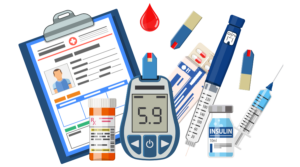Managing diabetes requires a combination of lifestyle changes, medication adherence, and regular monitoring. While there are more than seven important aspects to diabetes self-management, here are seven top tips to help you keep your blood sugar levels under control:

1. Monitor Blood Sugar Levels: Regularly check your blood sugar levels as advised by your healthcare provider. Monitoring helps you understand how your body responds to different foods, activities, and medications, enabling you to make necessary adjustments.
2. Healthy Eating: Follow a balanced diet that includes whole grains, fruits, vegetables, lean proteins, and healthy fats. Limit your intake of processed foods, sugary beverages, and high-carb snacks. Controlling portion sizes and spreading meals throughout the day can also help stabilize blood sugar levels.
3. Physical Activity: Engage in regular exercise as it can improve insulin sensitivity and help manage blood sugar levels. Aim for at least 150 minutes of moderate-intensity aerobic activity or 75 minutes of vigorous-intensity activity per week, along with muscle-strengthening activities on two or more days per week.
4. Take Medications as Prescribed: If your healthcare provider has prescribed medication, take it as directed. Never skip or adjust dosages without consulting your doctor.
5. Stress Management: Chronic stress can affect blood sugar levels. Engage in stress-reducing activities such as yoga, meditation, deep breathing exercises, hobbies, or spending time with loved ones.
6. Regular Medical Check-ups: Schedule regular check-ups with your healthcare team, including your doctor, diabetes educator, and eye specialist. These check-ups help track your progress and detect any potential complications early.
7. Educate Yourself: Learn as much as you can about diabetes self-management. Understand the signs of high and low blood sugar, and know how to respond to them appropriately. The more informed you are, the better you can manage your condition effectively.
Remember that diabetes management is individualized, and what works for one person may not be suitable for another. Always work closely with your healthcare team to create a personalized diabetes self-management plan that fits your lifestyle and specific needs

